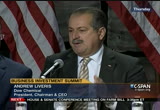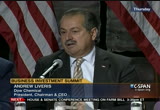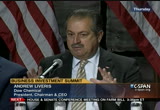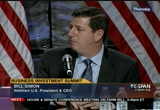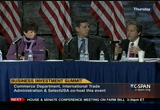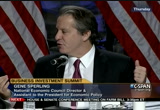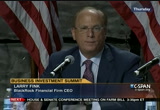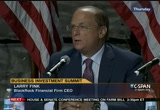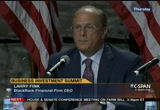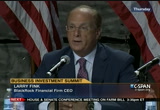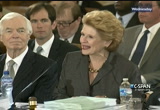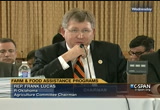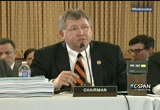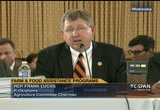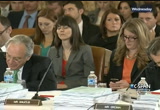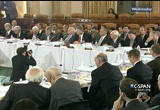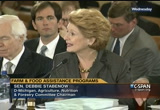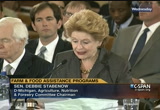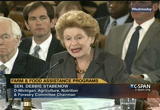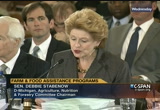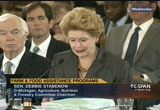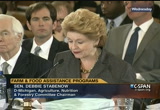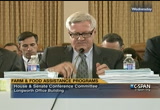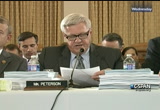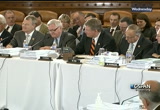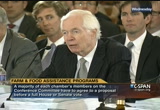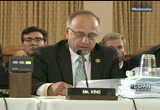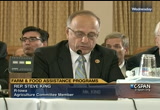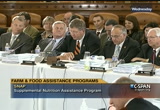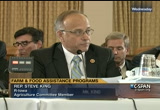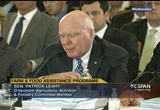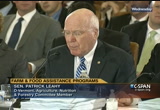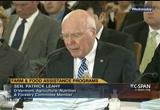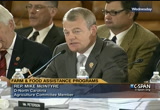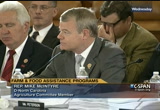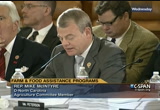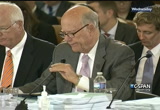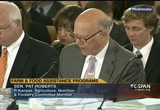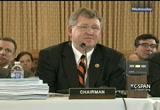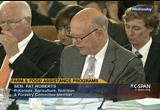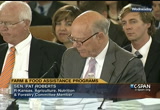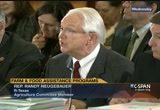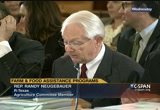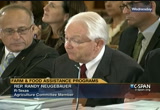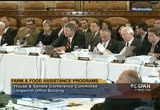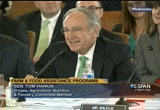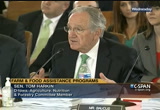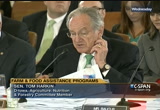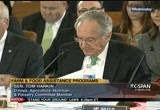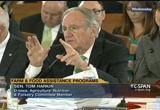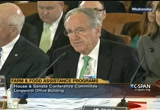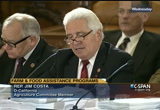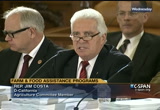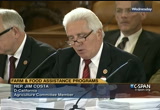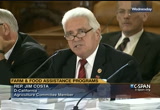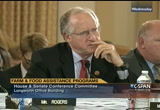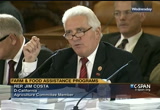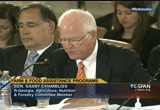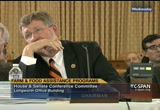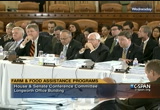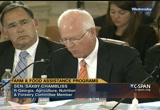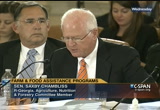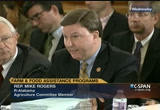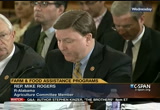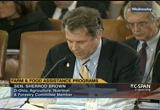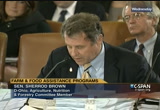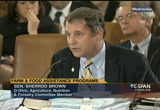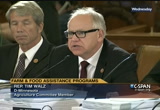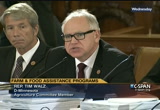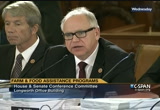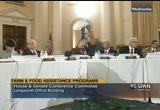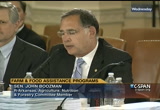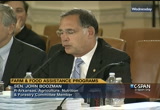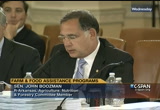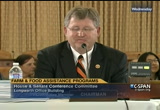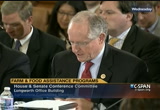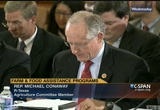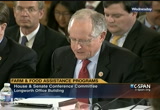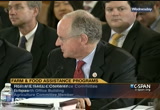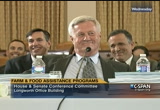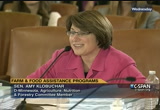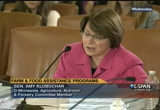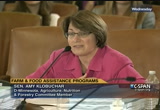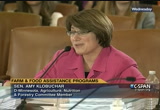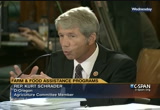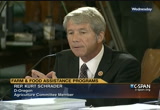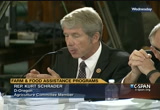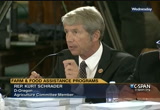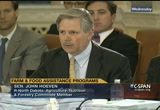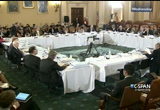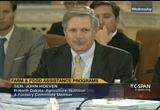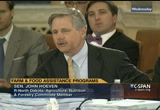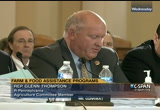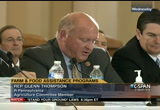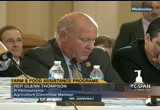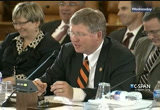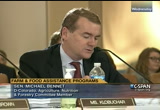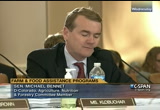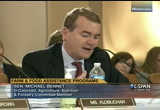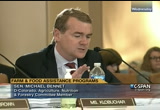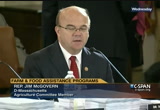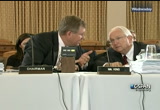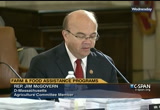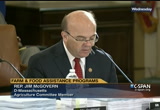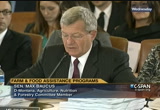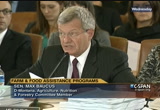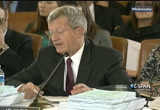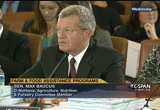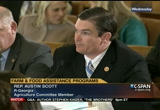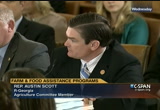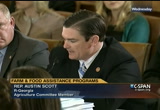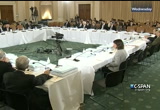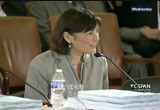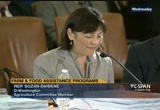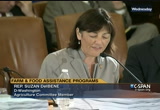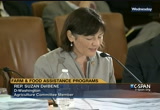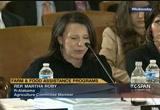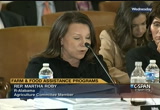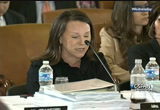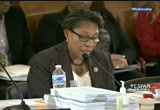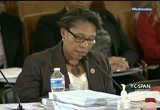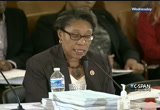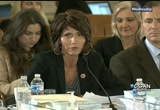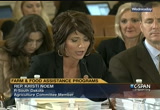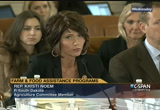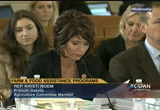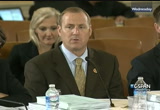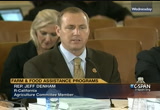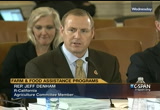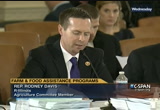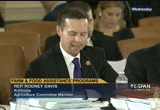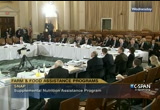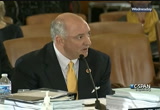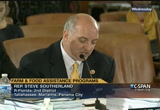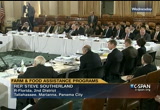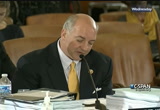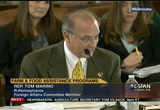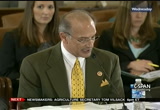tv Farm Bill Conference Committee CSPAN November 3, 2013 3:20pm-5:46pm EST
3:20 pm
u.s. economy, 100 years of growth does the, forward, upwards and onwards. our infrastructure is about at 3.0. other economies, like you said, larry, are putting in versions 6.0 in infrastructure but has not got their private sectors up that much. they will enter, but not enter where we are. they are licensing our technology. they learned from the mistakes we have made. they are like nation states competing. other countries are going to catch up on the private sector side of it, especially if their infrastructure is advanced. many of us are involved in ideas here. this capital point he makes -- and he is the doyen of understanding that -- and how we
3:21 pm
can model and maybe i can go to an example. it works and it works really well. it is a profit maker. it is a government arm, but a phenomenal example of how all things government are not bad, right? we need to figure out how we do that for infrastructure. we need to have a summit approach to that topic alone, because i think ports and rail and airports and all that, this is becoming a bottleneck. the positive side is the reason our energy market has become what it has become is because we have infrastructure. this country's pipeline and storage networks and energy, which is why it is so important that we do not disable that -- that is why we have a domestic energy sector that is so competitive, to make a point. there is proof positive to why your question is something we ought to tackle.
3:22 pm
>> we move products all around the world, and our supply chain is world class. it rides on infrastructure, and and we see infrastructure across the world, and we have opportunities to improve the infrastructure. andrew's point is a good one. other markets are generation- skipping. the term infrastructure conjures up a stodgy picture. it is really innovative, it is really dynamic. what was a 100-year infrastructure life cycle became a 30-year infrastructure life cycle. it is becoming a seven i think eight year infrastructure lifecycle. investment and the discussion around revitalizing, rebuilding, is not an initiative, should not be an initiative, it should be a permanent fixture because the frequency of innovation and technology and infrastructure technology adaptation will continue at light speed as we advance over the next 10 or 15 years. it needs to be a base of what we do from a policy perspective.
3:23 pm
larry is dead on. there is a lot of private capital dollars ready to invest in that once we figure out the policy side. >> a reaction to what you have heard? >> obviously, we have heard this a lot, and larry obviously organized a discussion for us that we had at the white house with investors around the world. we have responded in proposing ensuring that our tax laws is generous to a foreign pension, as it would be to a domestic pension, so that is one important area. some of it is all of us working together because it is not just the supply of capital. it is making sure at the state and local government level that people can figure out ways to create a steady certain revenue stream that is what these
3:24 pm
potential foreign investors and others would be interested in. again, i think it is, as bill is saying, not limiting ourselves to a narrow view of infrastructure. to give you a small example, something that would affect a lot of different countries is the president is insuring an initiative that will happen, because it is regulatory, to the fcc, to ensure that every school in our country has enough high- speed broadband that every child who sits at their desk with an individualized learning device. that is an infrastructure that if you put that in place him a bill is just saying what is a new exciting thing out there? if that is out there, the new
3:25 pm
exciting thing may an entire industry of lower-cost educational devices that every student has. now suddenly, you have education content among not from textbooks, etc. we obviously are very focused for jobs reasons and infrastructure reasons to improve our airports, roads, bridges. we need all that, and that is partly an idea of fiscal of our tax laws. we're working on that. keep our eye on the 21st century because that type -- one of the first mover jumps that the united states got at the end of the 1990's is our small businesses and entrepreneurs were using the internet first and foremost. that generated a lot of inventory improvement, and growth and productivity spur we productivity's bird we had -- productivity spurt we had. one of things i want to say, we are doing selectusa here, but we learn from other countries. we look at what south korea is doing on universal broadband for schools. we listened, when the president did his in sourcing for them, he
3:26 pm
listened to other countries why they chose another country on things that we could have done better, and it has affected what we have put in in this new reformed. we are trying to improve, but we are listening and learning, and if we do not mention something here, and it is something you think makes a difference in your investment decision, please bother us. >> we welcome that. i am beginning to get the sign that our panel is coming to a close. before we end, i want to ask larry -- larry and i had dinner in the midst of the government shutdown with looming potential calamity if we did not raise our debt ceiling, and you were frank with me and frank publicly as well about your perspective. andrew, you have been outspoken, and i have the opportunity to speak to your folks at walmart during this time as well. larry, maybe if you could share
3:27 pm
your perspective on what that does to the united states in terms of our reputation and potential for investment around the world and your perspective going forward. >> thank you, valerie. let me start and say i am bullish on america, but washington is making it more difficult for me to remain bullish. we are the standard bearer of principles. democracy in america is a standard. countries worldwide look to the united states as a bearer of standards. we are the principal nation in the world, and by these hundreds of years of principles, we have had the luxury of being the currency that is in trade worldwide. we are the reserve currency of the world. as a result, we have a luxury that we could borrow billions of trillions of dollars of money
3:28 pm
overseas. over 50% of the outstanding debt of the u.s. treasury -- i am not talking about the debt owed by the federal reserve at the moment -- that is issued by the treasury is held by foreigners. when you have a narrative that is talking about default, a narrative of threat, it goes against all the principles, and i would challenge anyone in the room -- can you go to the bank and say i will not pay my loan, what kind of behavior the bank will give back to you. we should expect that type of we should expect that type of behavior if we continue to act in this petulant way, that we think we could use a statement of walking away from commitments, looking away from principles. and so, and i was a source of many angry phone calls from many foreigners who have been
3:29 pm
investing billions of dollars in u.s. debt. and i do believe i have called everybody down, but we're in the midst of another negotiation, as we speak. we have a process in which we are going to learn in january where we are again. this process has to be much smoother. it is important we drop the conversation about default. and importantly, i talk about foreign aid, but i can tell you ceo's in the united states i spoke to, it does not matter what industry am a they are pausing, putting pause on hiring, they are putting a pause on investing, until they understand.
3:30 pm
the average ceo is five years in the united states. and so to build something that andrew is building, an eight- or 10-year project to complete, you have to have confidence when building out for these hundreds of thousands of jobs. this narrative in washington right now is forcing everyone to put a pause button on. i'm sure consumers in this country are putting the pause button at a very important time when we have christmas sales coming up. so i am alarmed. i remain to be alarmed. and one last thing i would say, if washington understood how many tens of millions of dollars, hundreds of millions of dollars were wasted with every company setting up contingency plans if there was a default -- i had work teams working all weekend long, the people working towards the what-if scenarios and what do we tell our clients, what does it mean if there is a
3:31 pm
default on u.s. treasuries? if one of the u.s. treasuries does not meet its coupon payment, that is a bad for all treasuries. if you have all these issues, and it has created a lot of excess noise, it creates this uncertainty around how do we navigate? i am bullish on america. i think we have more opportunity in the next five years than we have had in the last 10. we need the narrative to be much more pro-opportunity and less narrative about talking about things about walking away from standards and principles. >> thank you, larry. and as you know, president obama [applause] president obama is all for making sure that we pay our bills on time and we will do
3:32 pm
everything possible to avoid any future such crisis, because we would much rather, those of you who were doing contingency landing, were instead. out how to invest in america. that is what selectusa is all about. i want to thank each of the panelists, larry, andrew, bill, gene, for taking time to be with us this morning, and our time is not finished, so thank you. [applause] [captioning performed by national captioning institute] [captions copyright national cable satellite corp. 2013]
3:33 pm
>> taking a look at tomorrow's washington journal, would begin the program with william hoaglan d. with kaiserappleby health news, she is a senior correspondent. she will talk about the health care laws implementation and too and what to make of the insurance providers canceling policies. they will talk about the recent and how the housing market is affecting operations. that is all on washington journal, along with your phone calls, e-mails, and tweeps on monday. libertiesvil
3:34 pm
oversight board will meet to discuss possible changes. we will have live coverage at 9:15 on c-span 2. helpsews and report will a discussion on how care and the challenges that hospitals are facing. will hear from the former hhs secretary and the heads of the cleveland clinic and texas medical center on c-span 3. >> one of the tenants that is credibly important -- is incredibly important is the concept of universal service, the idea that all americans should have access to comparable and affordable telecommunications services. as we have gone through this evolution of going from plain old television service to a broadband world, to an ip world, how do we ensure that americans
3:35 pm
have access to the same services and applications that come across those networks question mark that has been a big focus to them aboutg how important it is to maintain the tenants of universal service, what that means, and how that mechanism has allowed folks to have comparable services. >> making the jump from copper wire to fiber optics, monday on the communicators at eight: -- 8:00 p.m. rex i am started by a few of the items. she often worked with one of her favorite designers for her suits and outfits. this is the outfit she wore to the former opening where she and i met prince philip. fabric withinted many of the houses that the
3:36 pm
eisenhower's lived in during their marriage. it also includes the symbol for general eisenhower. these are a few examples of the day dresses. she was very fond of the color pink and wore it in many different shapes and styles. jackie kennedy is well known for the little black dress and here are two examples. she always said she would never dress like an old lady. these down so she were well into her 70's and 80's, show her love of right colors and fabrics. >> the first lady, monday night on c-span and c-span 3. also on c-span radio and c- span.org. >> house and senate conferees met to work on differences over the farm bill, including funding for food stamps, which is one of the wider gaps between the house and senate version of the bill. the house wants to cut $40
3:37 pm
billion over 10 years. here is the first meeting. it ran a little under one hour and a half. >> good afternoon. coming,een a long time but we are here and it is wonderful to have the opportunity to have all of us here today, to get up. i was thinking, mr. chairman, that when you and i started, i remember when you and i came into the house, we were at the low end of the totem pole on the agriculture committees and that we both have the honor of working together and it really is an honor to work with you as we bring this wine will farm bill home. this has been a wonderful process with our agricultural leaders. our first farm bill to pass the senate. we have had a very important and i think president opportunity to
3:38 pm
show how to govern. , going back working to the supercommittee, and i just have to say one more time that we are proud of the fact that we were the only committee that came together in a bipartisan asis to offer to .eficit reduction -- asmy honor to nominate chairman of the congress. there is no objection. there is a second. so ordered. mr. chairman. >> thank you, mr. -- madam chairman. that is a good way to start. you are exactly right. we are very fortunate to be at this table, to have an andrtunity not only to try
3:39 pm
move agricultural policy forward, but to make sure the tools are there for our farmers and ranchers. to make sure the safety net is there around the planet. you alluded a moment ago to the togetherty to work with some very wonderful people and this table. rarely do you get the chance to work in this fashion, as you and i have, with the very people who were our mentors when we arrived and are our partners now, as we craft this policy together. i would just say to all of my colleagues, i know that we face some daunting challenges, that we are working in a very complicated environment to craft a very technical bill that touches so many important parts of our society, of our economy and of this country as a whole, and i know that there are many
3:40 pm
different perspectives on social policy, on agricultural production policy, but i'm confident that the spirit that's been demonstrated in achieving this point, passage of both the bills out of the house and senate committees and across the floor, that we can accomplish that. and i would be most remiss if i didn't note the special appreciation i have for my ranking member and my friend, i believe, collin peterson, as well as all of my friends at this table, and most assuredly those on the other side of the table. i take this responsibility that we have together to accomplish this very important goal very seriously. i live in the part of the country where between mother nature and federal policy, on two -- almost three occasions in
3:41 pm
this last century, my folks saw their way of life nearly completely destroyed. i know that we cannot persuade mother nature, necessarily, on any given day to do things differently, but we can provide the tools that enable our producers back home to withstand both the forces of nature that perhaps they have no control over on any given day as well as the markets and the advance of technology and international trade and all of those things that together affect us. and if the droughts in the midwest last year wasn't a clear enough reminder about the tools that are necessary when it comes to agriculture production, then most assuredly the blizzard of not many weeks ago that wreaked such havoc across the dakotas stand as a solemn reminder.
3:42 pm
and also, not just on the side of the chart where we help make sure there's enough food and fiber, but on the side that reflects the struggles that many of our fellow citizens have meeting their needs every day as consumers. the nutrition title is a very important part of the national safety net and how we address all of those components most assuredly will affect the lives of literally millions and millions of people across the country. so i would say this to my friends all around this table, it took us years to get here but we are here. it may take days and weeks perhaps to finish crafting what we'll call the 2013 farm bill in popular discussions at the
3:43 pm
coffee shops, but we can do it. we have to do it. we have a responsibility to do it. with that, let me simply say to my colleagues, let's not take it years to get it done. i now recognize the distinguished gentlewoman from michigan, the honorable chairman for her comments, senator stabenow. >> thank you, mr. chairman. in a congress that's often too divided, it's refreshing that we can come together in agriculture, work across the aisle and accomplish real reforms. we have an incredible opportunity with this conference committee to finally get this five-year farm bill done, and i agree with the chairman, working together we will get it done and we'll be able to demonstrate to colleagues in both chambers that we can really govern together which i think is so important. in june, the senate passed a farm bill with an overwhelmingly
3:44 pm
bipartisan majority of 66 votes. and i want to thank my ranking member, distinguished senator from mississippi, senator cochran, for his leadership and his friendship. our bill represents the biggest reforms to agriculture policy in decades. along with the house, it ends direct payments. we tighten payment limits, modernize dairy poll circumstances stop people who aren't actively engaged in farming from getting taxpayer subsidies. and the senate agrees with the house that our focus should be on reforming and strengthening crop insurance. we've heard from the beginning that risk management was the key priority for our farmers and our ranchers all across the country. and our bill reflects that by expanding crop insurance to cover more farmers and more kinds of crops. we also agree with the house that it's important to have an effective permanent livestock disaster assistance program that the chairman referred to.
3:45 pm
between the droughts of last year and the early snowstorms in the dakotas, we have seen the importance of having the disaster assistance in place. as the senate has made these reforms, one of our top priority has been to reduce market distortions. designing agricultural policies that are risk based, market based will be a critical goal in our final negotiations. we also worked hard to make sure the senate bill would not be trade distorting while promoting u.s. agricultural exports that our producers all rely on. as we make this shift to risk management policies, it's very important that farmers and ranchers continue to do the things that make them the best stewards of our land and our water resources, by reconnecting conservation compliance to our now strengthened crop insurance program, we protect the future
3:46 pm
of agriculture for our children and grandchildren. we must also save fragile grass lands from destruction from the sod saver program that protects these landscapes and habitats while keeping management decisions with our farmers and our ranchers. the good news in the conservation title is that both the senate and house have similar reforms that will strengthen our partnerships with farmers, to protect our natural resources for future generations. i'm pleased to see that both the senate and the house have a strong specialty crop and horticulture title. organic and special food production because we know that 47% of the crop value comes from specialty crops alone. the senate bill helps create new jobs through a robust energy title. this title helps our country be more energy independent, saves farmers money and helps
3:47 pm
consumers at the pump. this is a win-win-win for rural communities and america's future. for our farmers, crop insurance is a lifeline when disaster strikes. for american families, snap provides a lifeline when they face family economic disasters. we worked hard in the senate, mr. chairman, as you know, to make real reforms to save money in food assistance. we cracked down on fraud and misuse to make sure that every single dollar goes to families that need it. and that's the approach we will need to take to achieve bipartisan support to get a final farm bill. it's also critical to note that this friday, $11 billion in cuts to families will take effect across the country. for those getting food help, and that means every child, every senior citizen, every disabled veteran, every person who's lost their job will have a more difficult time putting food on their tables.
3:48 pm
also, that $11 billion, plus the $4 billion in cuts in the senate bill, mean that accepting this senate nutrition title would result in a total of $15 billion in cuts in nutrition. the good news is that c.b.o. projects in their baseline that over $14 million people will no longer -- 14 million people will no longer need temporary food help because the economy is moving and they'll get back to work. while there are many areas in a are similar between our bills there are differences. one i'll mention. one area of great concern is the provision that would override states' constitutional authorities on a wide range of issues including labeling of artificial sweeteners just to name a few. mr. chairman, i am very pleased to be here with you in this conference committee where i am confident we can work through these difficult issues and we can come together, make tough
3:49 pm
choices, set priorities and find common ground. there are 16 million men and women whose jobs rely on the strength of agriculture. they're counting on us to work together in good faith, get the farm bill done, and i'm confident we won't let them down. thank you, mr. chairman. >> thank you, madam chair woman. the chair now turns to the gentleman from minnesota, the ranking member of the house ag committee, mr. peterson. >> thank you, mr. chairman. thank you for your leadership and hard work in getting us to this point. you've done an excellent job, and senator stabenow over in the senate, senator cochran for his good work and senator roberts in the previous congress. we've been -- i think like everybody i'm glad to be here. i'm going to try to exert some leadership and be brief and we'll see how that goes. but anyway, you know, we're hopefully at the beginning of the end of this process. and, you know, first started
3:50 pm
this almost four years ago when i was chairman and i probably got started earlier than i should have but this has been going on too long and i think i speak for all of us in saying it's long past time to finish this farm bill. the difference between the house and senate farm bills, all titles and programs, commodities, nutrition, conservation, dairy, nutrition, even permanent law, and they all need to be addressed. resolving these issues poses a challenge but i know our respective agriculture committee members have the background and the experience to develop sound farm bill policies. and i believe that if the conference committee is left alone and allowed to do our work, we'll be able to find some middle ground and finish the farm bill. i think we got a good group of conferees, and i know that everybody's committed to finishing the job, so, you know,
3:51 pm
we've been working on this bill for so long that i think we're actually at the point where most of the staff work has been done. and really it's time for the members now to start making the compromises necessary to put this bill together so it can be defended and clearly explained to our colleagues and the general public. it's time to put together a bill that can pass in had both the house and the senate and be signed by the president. so with that i'm not going to go into all of the issues. i think they've been covered to some extent already. anybody that's paying attention has heard more out of me in the last four years than they want to hear anyway so i don't want to say it again. so i just hope we can find a way to move forward, get these things worked out and get this resolved as soon as possible. so with that i yield back.
3:52 pm
>> the gentleman yields back. the chair now recognizes the ranking member of the senate agriculture committee, the gentleman from mississippi, senator cochran. >> mr. chairman, i'm pleased to join our chairwoman and our members of the senate delegation in thanking you for the efforts you are making to impress us with the decor and the space that we have here in the house of representatives. it brings back a lot of good memories for me and i know the others who may have served here in the house of representatives. but we know we have a serious responsibility today and that is to begin an effort to with some dispatch, too, to get a fair and workable farm bill reported back to our two bodies. we hope we can do that, recognizing the urgency in some of these areas where questions need to be answered in order for farmers to make decisions and others who are affected by this law.
3:53 pm
so you have our commitment to try to be a positive influence in this process. we thank you for your courtesies. >> the gentleman yields back. the chair now recognizes the gentleman from iowa, mr. king. >> thank you, mr. chairman. i'm very happy to be here today as we formally kick off the conference committee process in this 2013 farm bill. it's been a long and it's been a sometimes bumpy road to get to this place. i want to thank the chairs and the ranking members for their diligent work and determination to get us to this point today. chairman lucas and ranking member peterson have both been strong leaders throughout this process. i'm grateful to them and i'm grateful to the members of this committee, especially grateful to the staff for the staff which has done so much work behind the scenes. as we begin the conference process, i hope we can work together across the aisle to resolve the many issues critical to our farmers and ranchers
3:54 pm
around the country. it's time for congress to give our producers the predictability they deserve. we need to do that by passing a five-year farm bill as soon as possible. i'm proud to represent one of the most successful agriculture districts as we work towards that end. i entered in this process in 2012 with several priorities and many of them are in the underlying bill. i will be doing as much as i can to nurture this process forward for those and many other reasons. i appreciate the work that's been done in these bills, especially to maintain the role of federal crop insurance, and as our producers' safety net. it's become to be more reliable to producers with ad hoc disasters when i first arrived here 11 years ago. increase the coverage and allowed our producers to share the risk. another issue that's critical to iowans and americans is conservation. and with direct payments eliminated, it's important we provide incentives for farmers to continue to be good stewards of the land.
3:55 pm
it's been a lot of my life's work. i'm pleased in putting together some strong title 2 programs. i'm anxious to see how this plays out in this conference. one issue at the forefront is the nutrition title. as part of the nutrition subcommittee, i'll continue to work with my colleagues to reform the snap program, to cut back waste, fraud and abuse in the program, to assure those funds are available to those who are needy. the cost to snap has more than doubled from 2008 to 2012, as have the enrollees gone from 28.2 million up to 47.8 million. i'm interested and encouraged by the news that i heard from the chair from the senate side on this information. but finally, i'd add that an amendment that i added to the farm bill will remain one of my top priorities moving forward. it was accepted by a voice vote in both the 2012 and the 2013 markup. this amendment is found in
3:56 pm
section 113-12 of h.r. -- i developed it on the premise of having recognized that the commerce clause in the constitution prohibits trade protectionism between the states. it became relevant, though, after california passed the law in 2010 that mandates that beginning 2015 no eggs be brought into or sold into the state unless they're laid by hence, housed in facilities that effectively are double the from a cost to our producers. i will go deeper into this amendment as we discuss this. but the bottom line of it is no state should be allowed to regulate the production in other states, any state, including california's free to regulate, even overregulate their producers, but not to regulate the other 49 states. that's the topic that i'm confident that we will discuss. but, mr. chairman, i'm anxious to begin this process and i'm looking forward to working with
3:57 pm
my colleagues to finish our work on this bill. as i said, i realize i'm a little late in some of the states but not all the states and i yield back. the speaker pro tempore: the gentleman yields back. the chair must take note as he recognizes the next esteem senator that this is one of a couple senators over there i learned a great deal about the conference committee work from in the 2002 farm bill conference, my first experience of seeing how it was done, the chair recognizes the gentleman from vermont, senator leahy. >> thank you, mr. chairman. as you were speaking earlier and senator stabenow was speaking how fortunate we are to have two of you as chairs and the two ranking members, senator cochran and congressman peterson, as senator stabenow mentioned, the work with senator cochran, he and i served together for decades. we both have been chairs or ranking member of the senate
3:58 pm
agriculture committee. we worked on seven farm bill conferences in 1981. i can show you the scars. having people with experience, like the two chairs here and the two ranking members here helps a lot. it's been 13 months since the last farm bill expired. i have farmers and rural communities in vermont tell me every day how imperative it is we overcome our differences. it's not only a farm bill, it's a trade bill, it's a hunger bill, a conservation bill, deficit reduction bill, it's also a job creation bill. we passed a bipartisan bill twice in the senate. we had the republicans and democrats. we each had to give some but we did it. we assured a farm bill that supports nation farmers, rural communities, alleviates hunger, reforms commodity programs, ends trade destroying policy, creates jobs and saves taxpayers $24 billion.
3:59 pm
not bad. on dairy, farmers across the country support a margin insurance program. one that has to work in tandem with the market stabilization program. i hear this from the kitchen tables to the high school gymnasiums in the farm areas, agriculture areas in my state. we've done that in the senate bill. farmers remember the dairy crisis of 2009. they know the insurance program alone is not enough. if we don't have stabilization, we're going to cost taxpayers hundreds of millions of additional dollars, virtually guarantee another dairy crisis, will put people out of business. so there's a number of other things, which i'll put in the record. we have to have strong nutrition programs. i worked with -- i think people like bob dole and george mcgovern in the past coming together to do that. as chairman of the senate judiciary committee, i believe nothing in this bill should limit the authority of the
4:00 pm
secretary to protect our farmers from deceptive business practices. and we just need the certainty we have to have in this. we can do it. you got the leaders, you got the we can do it. you got the leaders, you got the men and women at this table in both parties who can do it if we really want to. i hope we will. thank you, mr. chairman. and thank you for your kind words. >> the gentleman yields back. the chair recognizes the gentleman from north carolina, mr. mcintyre. >> thank you, mr. chairman. we all know the road to this farm bill conference is long and we know we're glad this day is here and i do want to thank the leadership from both the house and the senate for your hard work and your consistency in bringing us to this point.
4:01 pm
the farm bill is critical to my home state of north carolina as agribusiness continues to be the number one business. employing approximately one out of every five north carolinians. for decades this committee has protected and strengthened our farmers, strengthened rural economic development, provide the nutritional support that we need for the most vulnerable in our society. i do look forward to us moving this to a conclusion. having a strong reform-minded, fiscally responsible, bipartisan bill we can pass and do it as soon as possible. we're all tired of waiting. we've witnessed the harsh effects of the unexpected winter storm that devastated the live stock industry in the midwest. this type of concern for our live stock industry those the importance of passing a bill and do it soon to give certainty and security to our producers because we know disasters can happen anytime, anywhere. rural development has been something we've seen make a difference. 85 of the 100 counties in north carolina fall under rural economic development opportunities for these programs. and that means not only helping our farmers, but it means economic development and jobs in rural area.
4:02 pm
it means the water and waste water projects that all of our county commissioners comes to talk about. it means broadband. it means the fire, law enforcement and emergency services that our communities need so desperately and it he means support for small business. so for all those who are listening and watching, this is about economic opportunity here in the united states and making sure that our rural areas are not forgotten. i hope we'll also be able to take care of the situation with the gipsa rule. i know that's something we want to take consistent. and make sure that we find the legislative solution that -- in a way that satisfies our w.t.o. trade obligations. we want to make sure we prevent trade retaliation against u.s. exports that could cause irreparable economic harm and find a legislative fix that provides sufficient label information to consumers while fulfilling our commitments to our trading partners. we also know that increasingly states across the country have made it harder for livestock producers to be able to sell their products all across the u.s. and the world. by limiting the types of restrictions they can place, the farm bill can ensure that
4:03 pm
farmers can sell their products across the u.s., stay in business and employ folks in our rural communities. i look forward to working with all of you, my colleagues. i know this is time to show the nation we do know how to work together. we can make a difference. and by god's grace and your commitment to do so, we will and we'll get it done in a timely fashion. thank you, mr. chairman. >> the gentleman yields back. the chair now has a particularly distinct honor and privilege of not only recognizing his neighbor, his original mentor and the fellow that will always be a chairman to him, the senator from kansas, mr. roberts. >> well, thank you, mr. chairman. i appreciate that very much. chairman lucas and chair stabenow, ranking member cochran, ranking member peterson, all my other colleagues, it is indeed a privilege to be here with you today to begin this farm bill conference committee.
4:04 pm
excuse me. we've all worked very hard to get to this point, and that's probably the understatement of my statement. and have already made significant strides, i think, in it achieving necessary reforms. for example, both bills do eliminate the direct payments and our commodity and disaster programs. we have heard consistently from producers in all regions, from yarn arbor, michigan, to wichita, kansas, that crop insurance is their number one priority. our producers are willing to put their own skin in the game to protect themselves against disaster. the full house of representatives and the senate have made the commitment to the supplemental coverage option and other provisions that crop insurance is the most responsible the farm safety net for farmers and for the taxpayer. however, i do have concerns with several senate provisions that unnecessarily duplicate regulation on farmers' practices
4:05 pm
and restrict our producers' coverage. for ranchers and livestock producers, i'm glad they expand the disaster program from the 2008 farm bill, including the livestock program. i appreciate the house addressing several burdensome regulations that a lot of us have worked on in the senate, including pesticides, farm fuel tank storage, the prairie chicken, gipsa and mandatory control of origin labeling. regarding nutrition and the snap program, the house passed similar reforms to legislation i've offered to tighten eligibility standards, close state loopholes and end wasteful and duplicative programs without harming benefits to those who need the most assistance. finally, i do have some significant concerns regarding
4:06 pm
two proposed commodity titles. the 2010 senate-passed farm bill contained real reform. we ended federal subsidies that encouraged farmers to plant for the government. i.e. target price programs. this year's version created a new adverse market payment program tied to decoupled historic base acres. the p.l.c. program went further backwards, in my view, and recoupled production to planted acres and sets high fixed target prices. modern farm bill should not create, planting, marketing international trade distortions. let me be clear, target prices should be decoupled and the government should not set prices at a level that practically guarantee profit instead of acting as a risk management
4:07 pm
tool, not to mention inviting serious problems with a w.t.o. complaint. let me assure you that w.t.o.'s stove is hot. in closing, we all around this we are all around this table for a reason. i am here and committed to provide certainty to our producers. and a forward-thinking farm bill that is responsible to kansans, farmers, ranchers, their lenders and consumers as well as taxpayers all across the country. thank you so much to the leadership of both committees, the producers that have participated in all of our hearings and meetings and all the members here for working to advance agriculture. i'm reminded of the remarks by the distinguished chairman emeritus of the sometimes powerful house ag committee, garza who said we strive to get the best possible bill and in the end result we get the best bill possible. the distinguished chairman of the house committee said we have to do it.
4:08 pm
it is our responsibility to do it. it is my view and also the view of our ranking member in the house, collin peterson. we're going to lose credibility if it we don't get this bill done. we have to get this bill done. thank you very much. >> the chair now recognizes the gentleman from texas. >> thank you, mr. chairman. thank you for chairing this conference committee and thank you for your extensive preparation that you put into bringing us to this point into getting us a new farm bill. over the past two years we have examined each of the programs you to determine what is working and what needed reform. this process helped us to achieve a smart farm bill for producers, consumers, and taxpayers. the bill achieved significant savings over 10 years, making a genuine contribution in reforming washington's out of control spending. by priorities for this bill are
4:09 pm
simple, we need our farmers and ranchers to make business decisions that are responsive to production and price without taking away what we produce, making good use of taxpayer dollars. the divide between production programs and nutrition programs has been well documented over the past three months. but our google -- our goal net,ns a strong safety elastic, helping people to spring back onto their feet. direct payments towards programs that are grounded in the market, we have strengthened public and private partnerships, sharing risk programs, like crop insurance. our proposals in the house and senate legislation allow producers to pool risk and insure themselves against smaller offices that could over time put them out of business.
4:10 pm
insuranceve a revenue program for dairy producers in line with the overall direction of the farm policy in the house and senate hills for market based support. it is important to me that we include that in the farm bill and i am hopeful that we can move away from other market distorting programs. one of the key issues must be country of origin labeling, which is not only trade distorting, but increases the cost about restoring real benefits. i am confident that we can come together and finalize an efficient program to support farmers and ranchers. admittedly we are far apart in some of our goals, but why does the safety net need reform? people are getting tangled and stuck in it. individuals that quite honestly do not qualify for the benefits, this allows us to save the lien's without cutting assistance to the families actually in need. this is not about weakening
4:11 pm
assistance, it is about making the program sustainable in the long term, a goal that i think we can all agree on. i am looking forward to working together on our shared goals and i am confident that we can finalize an efficient farm bill that serves the best reducers, consumers, and taxpayers. the gentleman for yielding back. the chair now recognizes another esteemed gentlemen from the 02 conference, the gentleman from iowa, mr. harkin. >> is a pleasure to be with you again, mr. chairman. this is the way things should work, get together in conference committees and work these things out. this is my eight farm bill that i have worked on. twice as chairman in 2002, when luger was the ranking member. on the house side it was larry in texas.
4:12 pm
and charlie. we got a farm bill in 2002, the senate was democratic, the house was republican, we got a farm bill done. in 2008 i was chairman and we did the 2008 farm bill. at that time it was my good friend, saxby chambliss, the ranking member, and on the house side of course it was collin peterson. there were long conferences. they dragged on and on. i know the you are there for those. i take what mr. peterson said earlier to heart. , we can doeft alone our job and we can reach the agreements that are needed. we always have to keep in mind when hammering out agreements
4:13 pm
that the farm bill will become law unless past by both houses and the president. we have to keep that in mind. it takes balance, bipartisan solutions and i am proud of the fact that we did that twice in the senate. we came back and passed it again in 2013. i might also point out that in 2008 the farm bill was vetoed twice and we had to override it twice. it was not a partisan effort at all. a couple of thoughts on this bill, we have asks farmers in this country to produce more and more and more and they have responded, but as we produce more, we see more and more of our soil going down the rivers. it used to be that when we did conservation programs it was to pay someone to take land out of production, crp, things like that, but as we have asked producers to produce more we became very much aware that we
4:14 pm
needed conservation on working lands for livestock producers that were producing more in terms of livestock. therefore we had significantly oversubscribed programs, twice as many seek to join the csp program as we are able to get in . again, i hope we can keep our focus on the fact that we need conservation on working lands. we put the energy title first in the farm bill. intended to strengthen it in 2008 and it is critical, i believe, to maintain the dollars in mandatory funding that we have put into the senate, crucial for our small communities that are building their own energy systems. conservation, i mentioned on for lack of what everyone calls conservation compliance, the fact is that the
4:15 pm
vast majority of producers artie do that. are we then going to then say to the few that might be bad actors that you can not have to do with the vast majority are doing on their own? i am hopeful that we can attack the conservation compliance program that we have. farmers are doing that already themselves. there are maybe a few bad actors out there. the commodity programs, i echo what has been said, beecher fulton minimize government programs on how much they grow, it should be their decision based on the productivity of the land and what the market demands, not what the government proposes. furthermore hope we do not interfere with the usda good- faith actions to carry out country of origin labeling. the last thing we have to say
4:16 pm
about food assistance, this has been a part of the farm bill since i started on it act in the 70s. we have always reached agreements on this and periodically i remember a long time ago working on fraud, waste, abuse, feet food stamps, different times calling for different circumstances, but the fact is we have a lot of low income people out there, a lot of kids, and i just say this that therepeople say are a lot of single adults out there who had to be working before they could get food stamps and things like that. a long time ago we learned that there were a lot of people out there who had been dean's to two allies, with mental health problems. they can do a little bit of work here and there, but they cannot hold full-time jobs, yet we have provided them -- we made the decision a long time ago to provide them with access to food.
4:17 pm
do part-time work and make some income at the same time, even though you do not have a full-time job and you still can continue to get supplemental nutrition programs. there are just a lot of people out there like that who do not qualify for disability, but they cannot work full-time, they fall into that gray area, but we should also be talking about the fact that if they have access to good food and nutrition, they are not crowding into our emergency rooms and things like that. i hope we can reach him reasonable agreements on the nutrition program to meet our obligations to the consumers of , coming from americans who have always looked to this committee to make sure that we do not have beggars on the streets and that people have access to affordable and nutritious food in this country,
4:18 pm
that is the least we can do is a great country. the gentleman yields back. the chair recognizes the gentleman from california. >> thank you very much, chairman lucas, chairwoman stab and now, ranking member peterson, and senator harkin, for reminding us of some of the history of how farm bill's work together, the eight that you have been a part of. and we used to have conference committees on a more regular basis. i think i speak for most of our colleagues here about today, it is about time, about time. we wanted to have this conference committee one year ago. it to does one year to have a conference committee. it has been three years in the making. it is time for us to step up to the plate and demonstrate to the american public that we are capable of working together on a
4:19 pm
bipartisan basis. after all, that is why they send us your, to solve problems. to talk about the nutrition title, i believe it should be and can be worked out, but rather than simply focusing our attention on cutting the program, i think that common sense reform is to go out around america and find a better way to deal with this. we have the product -- the pilot .rogram in the house that pilot program could be used across the country to help move those people who could be moved from dependency to independence. next, i think we enact serious reforms to the dairy program. i represent a significant part of san joaquin valley. it has perhaps among the largest and most diverse agriculture in america. many of you have been there.
4:20 pm
i know, i have been to some of your events. it is a great part of america. i am a third-generation farmer who has been in the dairy business, most of my family, since we came to this country from the azores. i expect we can no longer expect the american taxpayer to be on the hook for dairy producers by maintaining the status quo, a program that i do not think adheres to the basic law of supply and demand. that is why i think it is critical that we adopt the dairy security act, which passed in the house committee twice and was passed by the senate. also of great importance for many of us in california is the removal of the vague and overly broad king amendment. with all due respect, it is clearly targeted at california producers. this amendment is not only anti- california, but if you think
4:21 pm
a one-size-sets up fits-all policy to be determined in washington. for those of you around the table who believe you are a federalist, this is anti- federalism. we knowy it says that better than the states to act on their own behalf. and therefore i think we have to deal with that amendment. as consumers increasingly turn to organic products throughout this country, i think the organic certification cost share program supports our producers and maintains integrity of producers in the united states. we need to continue to improve on that. additionally in the 2008 farm bill, my second, we created some good work product for a specialty term that is technical, fruits and vegetables, we all love them. the environmental quality
4:22 pm
program and conservation innovative grants program provides important tools to create greater water efficiencies and conservation. i support the senate version. i think it is the way we ought to go. i think i want to urge my colleagues to improve the stockyard administration toguage that we referred that representative mike conway and i offered and adopted. i think it will allow the poultry and livestock producers to no longer have to worry about losing their marketing options, which is very important. finally, i think we need to provide funding for a study to determine -- rather, we are providing funding for a study to determine the impact of what has been controversial, the mandatory country of impact origin label. we do not need to study, it is not working and it runs counter
4:23 pm
to the world trade organization and our important trade partners in canada and mexico who have obviously protested that program. we also have an agreement with canada and mexico through nafta. this is an important issue that should be it resolved in this discussion. finally, american consumers and the people who put the food on our table, american farmers, ranchers, and dairy producers, of which my family has been a part of for three generations, they expect us to work together. when i go home, that is what they tell me. the goal is to produce the most in the world of the highest quality. nobody does it, nobody does it better than american farmers, dairy man, and ranchers.
4:24 pm
this legislation has had a history of bipartisanship. we should work in that spirit, sending signals to the marketplace that only a far -- five-year farm bill can provide. i want to strongly encourage my colleagues to leave partisan politics at the door so that we can work our differences out in this process. thank you, mr. chairman, thank you, madam chairwoman, thank you to the members for being part of this committee. we do this so seldomly. >> the chair recognizes the gentleman from georgia, mr. chambliss. >> i am pleased to be here today to begin discussions on the comprehensive, sound five-year farm bill. i know that all the conferees are here, ready to get this behind us and moving forward. this will be my -- will be my fourth and final farm bill is a
4:25 pm
member of congress and i recognize how difficult it is to combine all the diverse interests into a single piece of legislation that meets the needs regions, rural and urban communities at the farm bill impacts. through reform, streamlining, and constant consolidation, with the biggest issue facing our country being our growing debt and deficit, i want to commend the leadership on both sides. both the house and senate agriculture committee chairs and members for stepping up and doing the work necessary to find savings. while we take these essential steps, we must always do this in an equitable and fair member -- fair manner. this bill must not only work to protect producers in times of it must responsibly serve as the safety net for the nutritional well-being of low
4:26 pm
income americans. our nutritional assistance programs play a key role in ensuring that americans have access to the food that they need to lead healthy and productive lives, but we must take this opportunity to assess the programs and find savings while ensuring that those in the greatest need are provided a helping hand. agriculture producers face a combination of challenges like weather, input costs, and marketability that combined to determine profit or loss in a given year. in 2008 the farm bill provided a strong safety net that producers must adhere to in the honor of the same commitment to remain partners. i understand that there are different ideas about what safety net is best and i urge my colleagues to recognize that one program does not work for all crops. both bills before us attempt to provide producers with options
4:27 pm
to find what works best for them and that is certainly a step in the right direction. reportedly congress has taken a fresh look at our commodity programs while maintaining a safety net that is so critical to america's farmers. we should provide options while at the same time act as responsible stewards to the taxpayer. i have had my conversation with a colleague from kansas, and i am not saying anything he has not heard me say before, but frankly when we had the debate on the senate farm bill, there was general concurrence that the program complements the insurance for the program. producers do not feel that the revenue-based programs work for them. they do need to be provided an option to manage risk. i urge my fellow conferees to remember the importance of
4:28 pm
choices. i would like to recognize that the policies contained in the senate and house versions contain fundamental reform that meet our commitments in the world trade organization, eliminating or changing all title i programs to provide director -- direct support to those in cotton production. it remedies problems central to the dispute with the wto in brazil. in the end i am confident that we can reach our common goal of getting a farm bill across the .inish line alternately the reason we are here is to represent those who work the land each and every day to provide the highest quality agricultural products of anyone in the world. it is vitally important to the farmers and ranchers of georgia and across this great nation that we uphold the strength and the safety net that the american agriculture depends on in this
4:29 pm
farm bill. we have the opportunity to write a bill that could provide the highest quality food, feed, and fiber in the world. i would ask for unanimous consent to insert the following statement into the record and i look forward to working with the conferees in the week ahead. >> so ordered, the chairman yields back. after five long years of waiting to get to this conference committee, i am very happy that we are here now trying to resolve our differences and i am honored to be working with each one of you to try to craft legislation to guide our farmers and ranchers, giving them the certitude that they need. over $1 billion in farm exports every year, this is a pretty big deal to us. i am honored, this gives me an
4:30 pm
opportunity to be here and work on it. we strongly encourage keeping the food safety and inspection service cap fish inspection program, in addition to the commodities program that included the setting of target prices vital to many of our alabama farmers with strong support given the livestock release mandatory origin release mandate label. the negotiations that we face will be tough and i am certain that not every contrary will go home with everything they want, but it is important to be responsible with stewardship of taxpayer dollars to maintain the programs that are working as well as performing for those that do not. i believe that we can work through these differences to achieve real results to help the agriculture industry over the next five years. hopefully efforts will demonstrate the congress can function on behalf -- on the behalf of our nation. gymhe chair recognizes the
4:31 pm
-- the chair from ohio. >> thank you very much, mr. chairman. i appreciate the dog admit -- doggedness and leadership of chairman peterson. the reform job farms act 2013 is a bipartisan reform bill that provides tangible and workable solutions that continue our commitment to the hungry, to rural communities, the land, and saving taxpayers $.24 billion. i have held a series of roundtables, perhaps two dozen in ohio, where i have asked of them what the farm bill should look like. they came up with specific answers, doing more than giving opinions. they told me that they do not need or want direct payments. i have worked with my friend, senator thune, on the commodity with planting decisions
4:32 pm
being determined by the market and not by government programs. simply put, the ohio corn and soybean farmers must be able to decouple from planet acres. the senate's rural development energy title creates the funding reform needed to ensure that our nation's rural communities have the tools needed to succeed and that the bill incorporates many portions of the local farm food bill jobs act for local good productions and sales, rightly linking taxpayer support for landinsurance to management practices with premium support for farmers who net over 700 $50,000 per year. these are conservation practices, but most farmers are already doing them. this is good, bipartisan work. i expect we can resolve the differences around these programs. work outms are always
4:33 pm
bipartisan way. what i am most concerned about is whether with the house cuts to step funding, will the riders prevent us from completing the work on the farm bill that rural communities need. the snap cuts and harmful proposals would harm the really millions of children, seniors, those with disabilities, and many of those who hold low income jobs, and veterans. the house division will cut step payments simply because there are not enough jobs out there. is that the kind of nation we are? is that what we stand for? our farmers feed the world and are proud to do that. the house is seeking to break a decades- old bond between farmers and hungry americans. i will look forward to working with my fellow conferees to strengthen the strong -- the the safety net, reassuring
4:34 pm
long program in this committee for farm and food policy. >> the senator-year-olds back. the chair recognizes the senator from minnesota. >> to the ranking members and my colleagues, thank you for getting us to this point. thank you to the staff around here who have been working on this for years to make this possible. to the stakeholders, this is truly a unifying piece of legislation, always has been and will again. with aed conference unified bill will go a little ways towards restoring faith in the american public that we can govern and we are a people of vision, we are a people of big vision. this farm bill does not have to be the exception to that. we need to look on the road and this bill gives us the opportunity. thosee to look at programs that support economic policy and growth and one of
4:35 pm
those last year, renewable representingck, tens of thousands of american jobs. we spend over $1 billion per day on countries that hate us. keep it on the land, where we have things going. in the energy title, demand far outstrips supply. when the market is fair and open, producers are trying to access that. i anchor it to my colleagues to look at what our colleagues in the senate did and get mandatory funding. it will come back to us economically, in jobs, and national security. long-term in demographics, it could be 9 billion people, a 60% increase in food that people could have. the average web producer is a little under 35. it tells you that you cannot eat
4:36 pm
websites. our policies make a difference about who was on the land. i encourage my colleagues in the focus on the senate to education and building the capacity for the future. it also does the smart thing to have set aside some of these programs to make sure that a new person on land can access those things. i would encourage us to come again, thatce builds our capacity for the future. in looking at capacity for the future, the land is our truly great resource. our producers are truly some of the best stewards of the land and we need to be able to give them the tools that they need to preserve that land, making sure that that conservation title is fully funded, working on those lands to make sure that we are not making the choices for those producers. they have the right to make a choice that is best for them, make it smart, people have
4:37 pm
proven they will take advantage of that. my colleagues from south dakota have worked with us on sod legislation that is visionary, for land that has not been broken yet. also, let us look at a whole mother side industry outdoors for hunters, fishermen, people who take advantage of that. can come to compromises, we can think big, we can compromise, we can feed the world, clothe the world if we get our work done here. i would agree with my colleagues on this, we have no choice but to get this right and come together. the good news is that once we do it, the producers will do what they do best, feed and clothe of the world. >> the gentleman yields back. the chairman recognizes distinguished gentleman from arkansas. >> chairman, ranking members, i am sure you all are as relieved as i am to be here today,
4:38 pm
beginning a conference process that will complete the work of a farm bill that will continue providing the american people safest, most affordable, most reliable food supply that the world has ever known. the path has not been easy, we still have some differences to work out. this is the work that must be done. our forrester stakeholders, manufacturers, retailers, the most vulnerable members of our communities are counting on us -- the fivehis up years of certainty they need to plan for the future. equally important is the impact this legislation hasn't nation's economy. arkansas, agriculture provided over $17 billion in value to our state's economy in 2011. making up more than 16% of the arkansas gdp.
4:39 pm
the top 25 spaces in the production of different commodities, including rice, honey, and blueberries. as diverse as our states production is, our state as a whole has even more diversity in the crops that we grow. whether it is cherry's in michigan, weak from the great plains -- actually, you can get peanuts from arkansas now, or dairy from minnesota. this diversity requires a diverse set of risk management tools that meet the challenges that all of our producers face for every region. crop insurance is an important tool, but it is not the only one. other tools must be responsive to shallow losses but protect commodities from deep, multiyear price declines that can wipe out a family farm in just a few growing seasons.
4:40 pm
our safety net needs to be responsibly done to invest in the future, to enable the next generation to provide opportunities for our veterans who would like to work the land. we need to make sure that our research and scientific infrastructure is strong enough to protect families and crops from bacteria and disease, making sure our programs protect the most vulnerable members of our communities, maintaining the integrity and support from meeting the needs of those they are designed to serve. looking back, our differences were much greater years ago than they are today. thanks to the strong leadership lucas,chair, congressman congressman peterson, as well as the members of both committees, we are much closer to our goal with the five-year reauthorization of these
4:41 pm
critical programs and shoring a thriving rural america with security for the most vulnerable families. we will succeed in our efforts and i look forward to working with you to resolve any differences that may remain in doing the work that our farmers, ranchers, and agricultural communities deserve. >> the chairman recognizes the representative from texas, mr. conaway. >> is maintaining the crop insurance commodity title on this committee, i want to let everyone appreciate my colleagues in both chambers who have worked so hard to get us to this point, particularly the chairman, who has been challenged like job in the old testament. first, we are running in accumulating dangerous deficit and debt that will make -- will never get paid off.
4:42 pm
both the committees in the senate and the house of work on legislation that deals with this issue in a small way to reduce spending over the life of the farm bill, but the trouble is even if it is passed, it is a very small slice of the huge budget problem that desperately needs to be addressed. i hope that other committees in congress will be able to follow the lead set by the agricultural committee. second, we had better not screw up crop insurance, which has by $17 billion since 2008. for my money, that is enough. crop insurance is just about all my farmers have left. even their proposals have been cut or in these middle -- negotiations and some want to cut it even further under the delusion that they must get a green light from brazil. that is a fools errand.
4:43 pm
third, we need a strong commodity title, but there are unfortunately a lot of misunderstandings thanks to the groups who are recklessly obsessed over these issues. no one at this table is talking about going to pre-1996, where farmers had two flat for the farm bill. they should know that they both use plants to cap them at different levels and they should also be aware that that approach used in the house is the same approach used on the current acre program. why are both chambers taking this approach? we are tired of defending charges that we are paying farmers for crops that don't grow or people who are not farming. we simply want to make sure the farm bill benefits those decisions. we know from official economic analysis the congress relies on this approach with an often infinitesimal approach -- effect on the decisions.
4:44 pm
we also know that every option on the table is treated the same as the rules, despite rhetoric to the contrary, no option has an advantage over others. if programs pay out over the lossfive years and price ratios do not, a strong possibility, those programs will .hen be the targeted programs with all due respect, american lawmaker and former groups are building the case against the challenge for our countries foreign-policy challenges without exercising the risk. we need to reform the food stamp program with better policies. withnot as much concerned programs as i am with policies. the house bill would simply return the food stamp policy to the intent that resident clinton and the congress at that time encouraged individuals to work
4:45 pm
to receive those benefits. i recognize perception sometimes trumps reality in this town but i hope that asking people to work in return for food stamp not any form of cruel and unusual punishment. the dignity of work has been a common theme throughout the ages. i will be working to avoid placing undue regulatory burdens on our representatives and i want to put the gypsy the -- to rest, and mandatory country of origin labeling has proven to be a failed experiment. i look forward to successful completion of this farm bill so that we can have the uncertainty -- the certainty that our farmers and ranchers deserve. >> the gentleman yields back, the chair recognizes the gentlelady from minnesota. >> thank you very much, mr. chairman.
4:46 pm
doneor stabbed now has such good work in bringing together hundreds of votes on this. we did this the right way. ranking member, thank you for your good work. any friend of collin peterson is a friend of mine. i have heard good things and look forward to working with you. representative peterson, when i first ran for the u.s. senate i called representative peterson to ask if you would sit down with me for half an hour, he sat down with me for two hours after i drove for four hours and i sat down with him and he finally said -- put those away, all the farmers want is a fair deal and stability. that are about 11 people understand that 10 of them live in north dakota. i quickly realized the other person was collin peterson, so i thank him for all he has done for rural america. i am always reminded of the critical role that agriculture
4:47 pm
plays in our economy. it is no surprise that three of us on this committee are from minnesota. minnesota is number one in turkey. we are excited about thanksgiving. we are number one in green corn, sweet peas, number three in soybeans, number four in and we are also the home of some major agricultural committees that care about this bill, for mel, general mills, land o'lakes. being home last week i think many of us learned that the american people are sick and tired of others in the opposite corner in the -- opposite corner of the boxing ring, swinging punches. this is our opportunity to get something good out of the chaos, moved forward, do something good for the country. issues that i care about her i like the senate bill, the senate bill, 24 billion in debt
4:48 pm
reduction, we suddenly have interest in people who are not even from farm countries. secondly, the safety net, the strength and crop insurance program is very important. third, streamlining the conservation program from 2013. the numbers are similar on the conservation side, i think that is important. the representative brought up the favor provision. we introduced one in the senate the we are proud of in recognition of the importance of crop insurance, tendering the senate will conservation compliance rules to the program with the support of many groups, including the national farmers union, national corn growers, it national defense fund, it was quite a group and we look forward to working with the house on that. now the senator will address the work we have done with conservation challenges like flooding. we also have limited direct
4:49 pm
payments to form the commodity programs by strengthening some of the payment limits to make sure the people eligible or farmers and not urban millionaires. we have continued the successful sugar program. the livestock program, and i also strongly support the funding in our bill for the senate energy provision, including expanding homegrown renewable energy as we look at the success of reduced dependence on foreign oil, from 60% to 40%. a lot of it has to deal with what i have seen from biofuels, 10% of our nation's fuel supply, they have been very important to this change. the new farmers and ranchers provision is something we have worked hard on including in the bill. the importance of the snap and seniorsilies
4:50 pm
still need to put food on the table. the senate made some that's me -- much needed reform to the bill. i do not think it is the time to make deep, deep outs to the program. finishput it -- i will with the comment i just got in my office over the weekend, greg schwartz, a farmer in minnesota was hard at work, he left this message for us saying that we have been working on this farm bill for over two years now and we just want to get it done. farmers are working now on this year's harvest and if you do not hear from us it is not because we do not care, it is because we have work to do. i think that greg is right, the members of this farm bill conference committee have work to do. some farmers have some deadlines with snow coming in in minnesota . we have a deadline, the budget committee just started and we want to get our bill done. we have to get this thing done
4:51 pm
for the people of the country. thank you very much, mr. chairman. the chairman recognizes mr. schrader. you.ank i appreciate the opportunity to be a part of this conference. as a relatively new member, we make up one third of the house of representatives these days, my experience in the committee in the last congress and this congress was unequivocally the high point of my service here. the way that we worked together, the difference we show each the respect we showed each other was emblematic of what i thought we signed up for when i became a member of congress. i would like us to remember that. there are a lot of ways to get divided here. we agreed on a number of ways that our colleagues have alluded to. conservation programs, modernization before history,
4:52 pm
you know there is a whole host of things that i think we could agree on. we should emphasize, though, there are still some big issues to come, we are modernizing american daily pop -- dairy policy. there is some concern about it being an open-ended draw at taxpayer expense and i expect this move to deal with that issue. we have the same discussion going on, frankly, with some of our nutrition programs. the $40 billion figure that was a way to get us to conference was not a real figure and i do not think any member of this conference believes that that is a negotiable number. but there are significant and legitimate differences where we feel that that message should be -- again, i look forward to the robust discussion inclined more towards the senate number. i think that that is something that we should be able to figure out and work on your the end of
4:53 pm
the day. then there is the crop insurance piece with a difference of opinion from the pacific northwest. we have come to the right conclusion at the end of the day. i will point out that there are two poison pills on the house side version that have caused me great concern. one that is no longer germane to start with, it is restricting the state's ability to deal with one another. it is unconstitutional, not ofmane, as the progenitor the amendment suggested, it is a conference clause issue, easily not the jurisdiction of the ag restricting is not a road that we want to go down. the other one came up on the floor of the house, well- intentioned, i think, trying to make sure that the deserving people have the ability to get nutrition assistance, food thiss or whatever, but at
4:54 pm
point in time for many millions of americans are going hungry as a result of the greatest expression of their savings, they have maybe lost their job and this is not the time to make sure that these folks are discriminated against at the end of the day. i really feel that that also is the area of a different jurisdiction. the last point, i think, if we , inot get this job done here can guarantee you that our leadership will be glad to get this job done. what you knowow about nutrition, they do not know what you know about farm country policy. if we do not reach agreement in a bipartisan manner emphasizing what we agree on, not what we disagree on, we will lose control of the farm bill and we will have disaster before us. i really commend the chairman, chairwoman, the members for the great work they have done. we ought to listen to them,
4:55 pm
advocate the jurisdiction, we should get on with it, folks. >> the chair recognizes the gentleman from north dakota. >> thank you, mr. chairman. i am pleased to be a member of this conference committee and i want to begin by thanking you and ranking member peterson, as well as chairman stab and now and our ranking member cochran for their leadership. it has been very important as we work to craft their respective wills to be very important in the conference committee. thank you for your hard work. work we're doing here is very important on behalf of our farmers and ranchers, no question, but this is important work for our country. good farm policy benefits every single american. we have the highest wallaby food supply in the history of the world thanks to our farmers and ranchers. every american benefits from good foreign policy. , directly orbs
4:56 pm
indirectly, rely on agriculture and the positive balance of trade. this is absolutely the kind of work we need to be doing, absolutely the kind of work we need to get done. furthermore, not only are we making reform a better farm policy, but we are generating deficit and the debt. when we combine that with a long-term farm bill that creates you also generate economic growth. the economic growth will not only help to reduce the deficit as well, but it puts people to work. this is again important work for all americans. farm policy touches, let's remember, every single american in a positive way. some of the keys i would like to emphasize in this bill emphasize profit insurance, i believe all of you for across this country
4:57 pm
leave the farmers and ranchers want enhanced crop insurance, absolutely a priority. a lot of the members here have talked about revenue loss protection to help in those areas where crop insurance cannot. that is very important as well. we need to continue the sugar program, the livestock indemnity program for our producers, and we need conservation rules that make sense. in the house version you do not buy conservation compliance to crop insurance. i think that that is the right approach. obviously under the current program, if you are enrolled, then you are also tied to the conservation compliance reforms. we need strong support for ag research, where all of you who have worked in farm country, look at what ag research has done for genetic production. unbelievable, when you talk about productivity.
4:58 pm
the senator was kind enough to mention some of the work to be done on a bipartisan basis. she has been an absolute leader in some of the programs, particularly water management. it is an amendment that she sponsored on the senate side and i was pleased to cosponsor it with her. this can make a real difference in terms of water management in rural areas and a big difference in helping to prevent flooding. the last one i mentioned was for the crp program. we need to make it safe and eligible. this can make a huge difference for wildlife. it is a great program and i look forward to working with you on it. look, we can get this done, we need to get this done, this year, now, for farmers and ranchers, benefiting all americans. i very much look forward to working with all of you to get ofs ill done for the good
4:59 pm
our country. thank you, mr. chairman. , thee senator yields back gentleman recognize mr. thompson. >> thank you, mr. chairman. my thanks to ranking member peterson. in the houseembers and senate ag committee for their hard work and dedication in this process of passing a long-term farm bill reauthorization. this conference committee is long overdue. reforms have been put forward by both chambers to up it and modernize the nation's agricultural program to ensure the long-term stability of our economies. we are one step closer to the end goal. most would agree that we still have some heavy lifting to do in this conference. he committee him forrester has jurisdiction over titles two, eight, and nine.
5:00 pm
as a subcommittee we spent years examining the farm bill, along with a range of other issues under purview. i am very proud with the product we have put forward and passed out of the house. through this work we have made improvements reforms under all three titles improve outcomes. while many areas were similar to the senate bill, a number are different, including provisions to address areas in our national forest system infected by invasive species and fire damage. both the house and senate addressed this matter through different means. it is my hope that through this legislation we promote the health and well-being of our national forest system as effectively as possible. the preferred language and title ix, in title ix has bipartisan support. congressman schrader and i along with members of the house have worked hard to promote our forest product industries. this is a much needed change to
5:01 pm
the program. usda in secretary vill sack welcome this change if we act on this language. these are a few small but key differences put forward by the house bill that are deserving of this committee's consideration and support. i look forward to the work in these areas. in addition to the subcommittees immediate jurisdiction, i would like to make note of several differences particularly under the dairy and nutrition title stripped under the dairy title, we must move towards a more market-based system. oath the house and senate bills repeal the old price support mortgageand shift to a insurance program. however, there are some concerns that remain with the inclusion of any kind of supply management program. i personally believe this program is the wrong approach and will only serve to further distort markets and undermine stability, while limiting innovation. the need for reforms to the nutrition title has been recognized by both chambers. these are serious issue which --
5:02 pm
issues which have been the subject of a lot of politics for both sides. i'm hopeful that we can refrain from continuing down that road. the goal is to be protecting the taxpayers and our most vulnerable populations. i can assure you these are not mutually exclusive ideals. i'm confident that we can find a compromise worthy of support from both parties and chambers. i look forward to working with all of you as the process moves forward. thank you, mr. chairman. i yield back. >> the chair recognizes the gentleman from colorado. >> thank you, mr. chairman. i first will cite you thanks. i was worried as the person dead last on the side would mean that i would have to wait until the very end on the back and forth. i appreciate it. i thank you for it. i would have had a great education though if you had kept me until the end. i want to thank you and the ranking member for your leadership.
5:03 pm
we have appreciated it and admired it in our chamber. also, chairwoman stabbed now, for your incredible leadership, and ranking member conquering, for your sustained effort in getting us to this point. i feel privileged as others have said to be part of this conference committee, and i join those who have said that this is the way we should be doing our and thishis congress is the way we are going to be able to regain the confidence of the american people. not with the rock throwing and the screening, but with working together in a bipartisan and bicameral way. that is the expectation of our farmers and ranchers. ranchers drive colorado's $40 billion agricultural economy. it is critical we work through our differences to complete this process. if i can sum up what i've heard in the nearly 30 listening sessions we have had all across colorado on this topic, the message is very simple -- work
5:04 pm
together to give us the certainty of a five-year farm bill. work together to give us the certainty of a five-year farm bill. the senate farm bill reflects a bipartisan, principled, and practical compromise. i know the house has been working towards the same objectives. he have identified priorities, streamlined duplications, and broken away from old, inefficient habits. we ended the day finally of automatically issuing payments to farmers regardless of economic need. we strengthened crop insurance to protect the farmers on colorado's eastern plains against stubbornly persistent drought conditions. as colorado continues to break its own export records, it's gary sector has been especially affected by finding markets overseas. our bill moves away from price production on planted acres which will strengthen our farmers ability to export. we should be forward-looking to arrive at a commodity policy
5:05 pm
that supports this vital area of potential growth in the farm economy. our vill makes strategic investments in additional areas of innovation and growth. as others have said, it provides crop insurance and industry-led research and promotion for organics, an industry which is creating jobs at a rate of four times the national average. it provides mandatory funding for energy programs, a huge creator of new wealth in rural colorado. mr. chairman, we need a strong conservation title with robust resources in the final bill. like thester strikes horrible floods that we are facing in colorado, it is programs like equipped that provide immediate aid to struggling producers. our conservation title improved trip -- a portion to give the agricultural secretary with flexibility regarding match requirements, something that is critical to our farmers and ranchers in the west who want to pass their farms and ranches
5:06 pm
down to the next generation. this practical idea comes straight from colorado's farmers and ranchers in our bill would also place more land and conservation by once again linking crop insurance to basiction conservation practices. as for public lands conservation, we upgrade to healthy forest restoration act ,f 2003 to prioritize payments including colorado's beetle kill. there is bipartisan senate agreement for extending colorado's good neighbor authority to our national forest. finally, mr. chairman, as a former school superintendent, i've seen firsthand how access to food and life success are closely intertwined for our kids. no program written in washington is perfect. snap has proved effective during moments of high needed. we need to find a path forward that respects all people affected by this farm bill. with that, i yield. thank you. >> the senator yield back.
5:07 pm
the chair recognizes the gentleman from massachusetts, mr. mcgovern. >> thing too, mr. chairman. i want to thank you and the ranking member as well as chairwoman stabenow. i too want to thank the staff for the many hours of work they have put into this effort. let me set the outside, like everyone else, i very much want a farm bill. i look forward to working with the members of this conference committee to try to achieve that goal. from massachusetts, there are many important parts of this farm bill that will impact my state and new england. the dairy conservation and especially cropped versions -- revisions are critical for the part of the country i represent. i strongly support full and robust dairy conservation and specialty crop provisions in the final conference report. i'm also pleased to see that both the house and senate included language to close the animal fighting spectator loophole. both bills would prohibit
5:08 pm
knowingly attending an animal fight or bringing a child to an animal fight. i urge my colleagues to support these provisions. i would like to spend my remaining time on the issue of hunger. , as the my colleagues chairwoman did in her opening statement, that no matter what we do with this farm bill, a 5 billion dollar cut in snap will automatically go into effect in just two days. be $11 billion over three years. on average, this cut will mean a reduction in monthly snap benefits of about $30 for a family of three. that's about 16 fewer meals per month. i think it is shameful. it is going to happen on friday. we have a hunger problem in this country. it is not fashionable to talk about it. it is not a comfortable conversation to have. it is a fact. there is not a single congressional district in the united states of america, the richest country in the history of the world, that is hunger- free. 50 million americans struggle every single day to get enough
5:09 pm
to eat. it is hard to be poor. it is very hard to be poor. we must not make a bad situation even worse by piling on even deeper cuts. i regret to say that the house bill as written would do just billion fromng $40 our most important and effective and efficient program that helps millions of americans put food on the table. the house bill would result in 3.8 million hungry people being removed from snap altogether. about 200,000 kids would lose access to free school meals. would170,000 veterans lose access to snap. these are more than just statistics. behind every number is a human being, a child or a senior or a neighbor or a veteran who is struggling and needs this modest benefit. let me remind everyman for of this conference committee that outside of children and seniors, the majority of able-bodied adults receiving snap do work.
5:10 pm
they make so little that they still need help to put food on their tables. those who don't work are struggling to find a job in this still very difficult economy. it is unconscionable and unacceptable that we would make their lives more difficult. let's be absolutely clear -- the house bill, especially with regard to nutrition, would make hunger worse in america. like everyone else on this conference committee, i want to see a robust copper intensive farm bill -- comprehensive farm bill. i am willing to be flexible, i'm willing to compromise, i am willing to be reasonable. our farmers deserve a farm bill. out -- america deserves a farm bill. i will not support a farm bill that makes hunger worse. none of us should do that. with that, i yield back the balance of my time. >> the chair recognizes the gentleman from montana, senator baucus. >> thank you.
5:11 pm
thank you very much, mr. chairman. i particularly appreciate your recognition. all of us have spent the last week in our home states with the people we work for. -- theyage was clear are fed up. they are not happy with what we are doing here. here is to begin restoring some of that lost faith. the farm bill is about jobs. weather,rices and producers already face enough unpredictability. we want more certainty, and we are here to deliver it. tomorrow, montana volunteers will deliver their first shipment to heifers -- of heifers to south dakota. i am proud of that generosity, but they shouldn't have to do it on their own. restoring livestock assistance is one of the merry areas where i think we all agree. still, our differences are
5:12 pm
stark. the house proposed farm programs won't work for montana. montana farmers will be faced with the faculty -- with difficulty in guessing future prices and yields in order to choose between two programs that address different kinds of risk. neither of these programs will be effective because a farm option is essential in large counties, which we have, where one farmer could get held up while another has a record year. tying target prices -- prices two acres runs the risk of undermining decades of reform by influencing planting, very important decisions made across the country. we must carefully consider how best to honor our international trade obligations. america producers depend on the opportunities that it creates. there are many areas beyond title i where we need to find agreement. more than 70% of snap households in montana have children.
5:13 pm
in the richest country on earth, there is no excuse for kids to go hungry. we need a solution that doesn't hurt folks who need the help the most. strong forcen conservation -- forest conservation programs. we have distinct priorities. i'm going to stand up, but for those of montana, just as i expect all the rest of us to fight for the priorities in their home states. ,f we listen more than we talk we can produce a bill everyone can probably support. this is my sixth farm bill. i'm determined to lead montana and our country with certainty. success depends on our working together. our nation is watching. let's show the people that congress can work together. i might say, i remember the 2008 farm bill -- it was a wonderful conference. wonderful. you will recall. , bipartisan, bicameral, round the table, and
5:14 pm
we learned a lot about partslture in different of the country. i learned a lot about avocados les, peanuts-- app and cotton. a lot of folks learned about hard winter wheat. it was a very good session. we listened. we found trade-offs. we helped each other out. it was compromised. i must say, i'm reminded of the celebration yesterday of speaker tom foley. tom foley was one of the most wonderful persons i've had the privilege to ever know. i don't know anybody with more integrity, more intelligence, more grace, more decency, more hard-working than tom. was a public servant in the best sense of the term. he cared about the fifth district in washington, but he
5:15 pm
really cared about finding solutions. i urge all of us to remember speaker tom foley and remember what we can do and also remember that people are really fed up with us. we have an opportunity here to do something that makes some sense. that's why we are here in the first place. thank you, mr. chairman. >> i turned to the gentleman from and recognize the gentleman from georgia, mr. scott. >> thank you, mr. chairman. madam chair, it is an honor to join you and my other colleagues here today and to be a part of this conference committee. i'm confident that as we were together, we can account for some things over the next few weeks that will result in a farm bill that is good for our farmers, good for our agricultural industry, and good for the american people. as we sit here today and begin these negotiations, cotton, peanuts, and other crops are being picked in georgia. our producers and ranchers who have built their families and
5:16 pm
livelihoods on a successful agricultural industry now more than ever need the certainty of a five-year farm bill. the harvest will soon be a over. in a few months, farmers will begin preparations for the 2014 farm near. talking with their banks and securing operating loans. soon after, they will be turning dirt without the certainty of a far -- of a farm bill. this would all be very difficult. to achieve this, i know we will have to meet in the middle. i urge my colleagues not to consider compromise a bad word during these discussions. there are a number of specific goals i hope we can achieve together. first, our country part -- possesses a diverse agricultural industry. no one program to meet the diverging needs of all sectors. our producers need choices and safety nets. as my grandfather said, a farm bill should only be for the bad times, not the good times. nothing that we do should guarantee anybody a profit.
5:17 pm
thus providing producers with the choice of revenue, safety net, and price support programs is extremely important. i know nutrition programs have been a contentious issue throughout our discussions. our focus should be on changing the culture of these programs to provide recipients with a lifeline when they need it most, while creating a greater economic opportunity for these individuals to rise beyond the circumstances which have led to their need for the support. after serving 14 years in the state legislature, i believe nutritional programs can run under greater efficiency is administered by the states. i hope we can set these programs on a path for future state administration. ultimately, these programs should meet the goals of temporary assistance for which they were created while also helping those they serve onto a path of self-sufficiency and earned success. another issue in need of resolution is the current national pollutant discharge elimination system. the pesticide permitting process
5:18 pm
, these permitting requirements for pesticide applications are a perfect example of a duplicate of regulation with no public value. the application of such pesticides has already been evaluated by the epa on and under the federal insecticide and fungicide act, they have been approved. if these current policies remain in place, u.s. farmers will be required to permit the use of pesticides for such purposes the epa has already deemed safe for use. with the current language provided in the hospital, farmers will not be subject to for duplicative permitting pesticides that have artie been approved. finally, mandatory country foraging labeling remains a focus. tos case has the potential cause significant damage to our agricultural industries. over the past year, wto has ruled in favor of challenges which could possibly penalize dollars.billions of a resolution is a necessity. again, i look forward to working with my colleagues to address these issues, coming to an
5:19 pm
agreement, and providing farmers and ranchers with certainty. with that, i yield the remainder of my time. the gentleman yields back. the chair would ask the chairwoman of the senate -- my understanding is we -- is after 5:00, there is potential for a vote in your body? >> yes. yes, that is correct. >> i would note to my colleagues that the senate and ranking member will stay as long as they possibly can, but that is -- that does give us a sense of urgency. >> think you, mr. chair. i am very pleased to be here and to have the farm bill conference committee officially starting today. i want to thank the chairs and ranking members for all of your leadership in getting us here. only contrary from washington state, i understand how important this is for us. agriculture is a $46 billion industry and employs 160,000 people.
5:20 pm
my district has thousands of farms producing hundreds of millions of dollars of goods and is the nation's number one producer of red raspberries. for my home state and across the country, it is simple. passing a farm bill means healthy families and a healthy economy. the houser of agriculture committee, i am proud that we worked in a bipartisan manner to draft the farm bill. we didn't always agree, but we put politics aside to find solutions. i'm hopeful we can continue this positive working relationship and deliver a farm bill that is good for our farmers, our families, and food supply. settling for another extension is not good enough. uncertainty for our farmers, stymies critical research, and negatively impacts consumers in the economy. a comprehensive farm bill should include funding for specialty cropswhich represent -- which represent one third of the value of all crop production per year. we need to increase funding for
5:21 pm
programs like the specialty crop funding research initiative and the national clean plant network, which gives us great return on our investments. should bill shouldn't -- include increased funding for our local organic farmers. we also must work to protect the safety nets which millions of working families, seniors, and children depend on snap and other nutrition. -- depend on. reforming a program is one thing. arbitrarily cutting a program and recalling -- and calling it reform is another. i believe we can find common ground to bolster programs that help people get the education and job training is very to be self-sufficient. fought for i have the inclusion of funds to expand the innovative education, and job training programs that have been so successful in washington state. in addition, the farm bill
5:22 pm
should include the dairy security act. i'm hopeful that we can come together and agree on reforms that will safeguard our exports, protect producers, and shield consumers from price volatility. as the most trade-dependent state in the nation, washington depends on programs that open up new markets and support exports like the market access program and the foreign market development program. excellent examples of a profitable public-private partnership. there are still many other issues that must be addressed also committed to finding -- addressed. we must also avoid harmful amendments that have no place in the farm bill and will only make it more difficult for us to reach agreement. for too long, our nation has been without a farm bill. we were sent to congress to advocate on behalf of our constituents and to find solutions. farmers and families across the country are depending on us. let's not let them down. let's work together and pass a five-year farm bill that our
5:23 pm
country needs. thank you. i yield back. the gentlelady yields back. the chair recognizes the gentlelady from alabama. >> i'm grateful for the opportunity to serve on this conference committee. i also want to thank the staff of both committees for all of your hard work over the past several years. for those past several years, we have been working on new farm bills that would meet this country's agricultural and economic needs while enacting important reforms to farm and nutrition policy. i am very, very pleased that today that process is moving forward. this farm bill is a legislative priority for the people of alabama second congressional district. i have posted numerous town halls, held regular sedans with my own agricultural -- sit downs with my own agricultural panels.
5:24 pm
i'm proud that alabama is home to multiple land-grant universities that play an important role in developing new farming techniques and technology. this morning, i set him up the president of auburn university and learned about their cutting research that is shaping the future of agriculture. recognize that this bill needs to contain the kind of reforms that show congress is serious about changing the culture of spending and government dependence. our country needs agricultural policies that make sense. we need regional equity that allow the same opportunity and protections for all types of commodities, not just those in certain areas. we need an epa that helps farmers comply with the necessary regulations and not aggressive police-like agencies bent on punishing those that are trying to yield a crop. with an the direct payments to farmers, we must transition to
5:25 pm
an insurance system that allows for planning flexible too. it is time to consolidate duplicative programs administered by the usda. our country also needs a nutrition policy that makes sense. food stamps have played and will continue to play an important role in taking care of our most needy americans, but the program exists to help lift those up who have hit bottom, not keep them there. like president reagan said, the success of our welfare program should be measured not by how many the government can enroll, but how many families can get off assistance and become self- reliant. mr. chairman, i know that there are a number of differences between the house and senate bills, but i'm confident that we can find common ground. as many have said here today in this room, we have a very unique opportunity in this conference committee to prove that congress has not lost its ability to solve problems and make life work for americans. by working together, we can be the example to the rest of the congress.
5:26 pm
let's show the nation that its elected leaders can deliver on behalf of the american people. thank you, mr. chairman. >> the chair recognizes the gentlelady from ohio, congresswoman fudge. >> thank you very much. today, we began the long overdue farm bill conference. tole it will not be easy reconcile the differences between the senate and house bills, that is exactly what the american people are counting on us to do. farmers and families across the country deserve certainty and ability. -- stability. let's work across party lines and produce a competence of farm bill that recognizes the undeniable link between feeding and farming. of the housember agricultural subcommittee, the jurisdiction over nutrition issues, i am very concerned about language and the house bill that attempts to deny this long-standing universally accepted link. not only does it cut the supplemental nutrition assistance program, snap, to the
5:27 pm
tune of nearly $40 billion, but the house bill also authorizes attrition programs for only three years while all other programs for five years. both represent unnecessary and radical changes in our nation's agricultural policy. the house bill eliminates categorical eligibility and ends 'he ability of states abilities. willl know snap benefits automatically be reduced when the 2009 recovery act temporary benefit whose ends november 1. costing 80 families as much as $300 per year, according to the cbo. snap is the first line of defense for the most vulnerable among us and helps ensure millions of americans have access to food. the fact that the house even proposed and passed a bill with such unconscionable cuts to snap is beyond me. we do not turn our backs on farmers seeking help with crop
5:28 pm
insurance, and we certainly should not turn our backs on hungry americans. according to the environmental working group, taxpayers cost ofe 62% of the farmers insurance premiums. some subsidies can be as much as 100% of the cost of the most basic coverage level. crop insurance is the only farm income support program not subject to some form of means testing. that is why i support the senate language, which reduces the level of premium subsidies for farmers with an adjusted gross income over $750,000. some of my other concerns include the mandatory funding level for outreach and assistance for socially disadvantaged farmers and ranchers. the inclusion of central state university as a 1890 land-grant institution and the inability of schools to serve more fruits and vegetables under the fresh fruit and vegetable program. resolving these issues and others will not be an easy task, but it is the one entrusted to
5:29 pm
us. i look forward to working toward a collaborative solution. mr. chairman, i yield back. >> the chair recognizes a member who certainly understands how wicked mother nature can be, the gentlelady from south dakota, congresswoman noem >> it has been years we have been working on this program. i'm certainly thrilled to be at the table today. in south dakota, we have been reminded about why getting a farm bill done is so important. a few weeks ago, ranchers and my state face an early blizzard that killed tens of thousands of livestock. it devastated family operations, killed horses, sheep. one of the ranchers was telling me that this storm hit so hard and so fast that they found a rattlesnake rolled up on top of a snow bank. they didn't even have time on -- to take shelter. 17 hours of rain followed by dropping temperatures. the blizzard lasted three days. cattle literally walked off
5:30 pm
cliffs. they drowned in rivers. they piled on top of each other and smothered, which leaves him eligible for no insurance. that is why we have livestock disaster programs because they have no safety net and they are struggling today to stay in business. i talked with the owner of 90nbow bible camp who lost courses in the storm. he read me a letter that he got from a little girl that comes to the camp every year. she is nine years old. what she wrote was what i heard about all the animals that you lost, and i'm very sad. i hope we can have summer. a miracle is coming. i feel it. i will be praying. i think this farm bill could be a part of that miracle. we'll cover a portion of the losses. it certainly isn't going to make these people hold. it may keep them in business. she sent him $28.39 made up of mostly change and a few bills. mightote, i thought you need this. i will try to get more. every little bit counts. every little bit does cap.
5:31 pm
that's why we are here today. we can come together and get this thing done. his little girl represents the way that our nation has come together to support the agricultural industry. that's why we have a farm bill. that truly is what it is about. livestock disaster provisions i authored in the house bill would cover a portion of those losses. -- the crop producers, protect our prairies act is incredibly important. it is accountable to taxpayers, gives them savings, but also ensures that we have some conservation methods as well. that the farmure bill works for all producers. i'm confident we can include a permanent office of tribal relations within usda to improve programs for our native american communities. i had many of my trisomy they simply don't know how to access those programs or don't get enough communication to do so. a permanent office would ensure they have a chance.
5:32 pm
we need to have a food stamp program that is responsible but helps those who need it. we can uphold the integrity of the program, keep it safe from vulnerability into the future. should adopt the much-needed regulatory relief we included in our house bill. section 1013 of our bill insurers we don't have duplicate of and a nested -- and unnecessary permitting requirements of pesticides. i also want to talk about the subtitle.rea response it applies in some common sense to addressing the pine beetle epidemic we face in our forest throughout the west. it is painfully obvious when you look at our forest that we are -- that they are turning into a tinderbox. people's lives are at stake. we are one lightning strike away from losing towns and communities throughout our hills. we need to be able to go in there and address the issue. we have a chance. annuities depend on our forests, and they are the key to our western economy. the approach in the hospital is reasonable. it will give us tool to actively manage our forests the way we
5:33 pm
should have done years ago. i'm hopeful the senate will come to the table to find a solution that works effectively for our national forestss. what we should strive for is that we will work for producers in our states and our nation as a whole. we all have concerns about certain aspects of the bill. i'm sure it is not going to end up being exactly what we would write on our own. i'm sure we can come together and bring a safety net to agriculture for this country. i look forward to working with the chairman and the chairwoman and all of my colleagues. we are going to get this thing done. >> the chair recognizes the gentleman from california, congressman dunham. you, mr. chairman. it is an honor to be part of this conference committee. as well as a farmer representing california's central valley. the largest active state in the nation, 81,000 farms, $45 billion in aggregate new annually, 400 different commodities. california grows half the country's fruits, nuts, and
5:34 pm
vegetables. as a farmer, we are not looking for subsidies. we just want a fair shake. we want to have prioritization of research and development dollars. we want to have trade promotion programs. we want to have passed and disease prevention programs that don't allow our different industries to be devastated. these are simple things that can be rectified within the farm onlythat he not california's aggie economy competitive, but keeps our competitiveeconomy on the global market and we are also the number one dairy state in the nation. we need a workable dairy title that does not limit producers from reaching their true potential. as somebody who served in the state senate and was chair of the ag committee, i believe in states rights. states have the right to develop their own ag laws. we must protect those rights. a section of the house bill
5:35 pm
threatens many state marketing and plant protection laws. the nutrition program is also an important piece. our school lunch program should be made based on nutrition, making sure that our kids have the healthiest lunch possible, making sure that the foods they get, the fresh fruits and vegetables, are an important part, but we should be considering all forms. it should be based on nutrition for our kids. that's something i'm looking forward to seeing in this bill as well. the work requirements, i believe the house going as the first reformed to the snap program since 1996, encouraging able- bodied individuals to seek employment. let's get people back to work and utilize america's precious resources to help those in the greatest need. i yield back. the chair recognizes the gentleman from illinois, mr. davis. you, chairman lucas. thank you to everyone at this table.
5:36 pm
i would like to take a quick moment to wish a belated happy birthday to our colleague marcia fudge. i come from the land of lincoln. in fact, the district i represent has part of lincoln's old congressional seat. his home, his presidential museum and library, and his tomb. president clinton did a lot to advance agriculture in this country. in the span of three months, abraham lincoln signed into law an act to create the department of agriculture, a law establishing the land-grant university system, and the homestead act. if our predecessors can do all of that in three months, we ought to be able to take october, november, december and pass this bill. crop insurance -- i come to this table as a staunch defender of crop insurance. earlier this year, just two floors above us, secretary vilsack testified that crop insurance is working. this is a crucial risk management tool and requires our farmers to purchase a policy and
5:37 pm
then experience a verifiable loss before collecting a dime. that is called having skin in the game, and it is far preferable than tens of billions of dollars worth of ad hoc disaster bills. not a single penny in disaster assistance was requested after the midwest experienced a drought last year, and we had the crop insurance program to thank. we should be encouraging participation in this program, and i support the house provisions that strengthen this vital safety net. in additionelief -- to crop insurance, my farmers and producers tell me they need relief from epa regulations. i introduced an amendment that gives our farmers a place at the table on epa's regulation's that impact agriculture. this provision would also require an economic impact statement and trigger a review panel where former recommendations would be considered. this is an effort i worked closely with chairman lucas and ricky member peterson on, and i
5:38 pm
appreciate their bipartisan support. to nutrition programs, the house and the senate have agreed that there are reforms we can make here. we are told that unemployment is going down. yet we continue to have a record number of americans using snap. loophole and the instituting stronger work requirements, as the house has done, i think there is a lot here worth examining. on a separate track, with regard to provisions in this bill that deal with the food served in our schools, it is important to note that schools in my district what the flex ability to serve what their students will eat. finally, both chambers are recognizing the importance of reauthorizing university research programs. i represent an outstanding land- grant institution in the university of illinois. i want to thank chairman lucas for supporting the a line i colors on his tie today at this hearing. [laughter] the research they pursued through the agricultural and food research initiative within
5:39 pm
the national institute for food and ag is an important initiative i have supported. as one of the only freshman on this conference committee, it is an honor to be at the stable with a group of folks who want to get the spilled on. i came here to work. i'm hopeful we can continue the bipartisan momentum of the water bill and veterans bills that the house passed this week. our farmers, rural america, and all of america are counting on us. i yield back. >> the chair recognizes the gentleman from florida. >> thank you, mr. chairman. i would like to thank you and ranking member peterson, , and rankingenow member cochran. thank you so much for convening this conference committee on the 2013 "farmville". i would also like to convey my appreciation to each member sitting around a stable and the hard work that you have put in over the last several years. the agricultural industry forms ruralckbone of the 12
5:40 pm
counties of florida's second congressional district. your shared commitment to advancing sound agricultural policy is greatly appreciated by my people. in particular, chairman lucas, i want to thank you for your friendship and your leadership in the house. i said to many people, you deserve a purple heart for getting us to this point. i thank you for your patience and your hard work. i'm honored to participate in this process. both as a former member of the house agricultural committee and as the only member of this conference committee from the state of florida. the second-largest specialty crop reduce and state in america. this farm bill represents the critical step forward for our farmers, growers, and ranchers. i look forward to doing all that i can do to help restore the certainty that they deserve. the federal agricultural reform and risk management act of 2013 makes meaningful reforms to strengthen our rural communities.
5:41 pm
it provides for greater risk management tools, sustains our working forests, includes market-based very policies, specialty crops tools, and vital regulatory reforms, all while streamlining federal agricultural programs for hard- working rural families. i'm also pleased that the house- approved bill includes two provisions that i helped craft and sustains the economies of our rural communities, the bipartisan building rural communities act. it ensures that small rural areas have the access to technical assistance and training necessary to enhance the infrastructure all at no additional cost to america's taxpayers. another provision that we fostered with subcommittee chairman thompson would ensure qualifyld've products under the usda's bio-based marketing program. furthermore, the nutrition reform and work opportunity act of 2013 makes common sense
5:42 pm
reforms to the supplemental nutrition assistance program. it ensures that the truly vulnerable families receive the support they need and more efficient and effective -- in a more efficient and effective manner. for blessing the value of work in healthy, able-bodied adults, this legislation is the proven laid out in the 1990s. i look forward to working constructively with colleagues from both chambers and both sides of the aisle on the farm bill conference report that empowers our agricultural stakeholders and families who are vulnerable and who need this bill. i appreciate the opportunity to be a part of this important process. i look forward to sustaining and strengthening agricultural production in america. mr. chairman, thank you, and i yield back. recognizes then
5:43 pm
gentleman from pennsylvania, mr. marino. >> thank you, chairman. ,adam chair, ranking members first, chairman, i ask unanimous consent that mr. royce, the chairman of the foreign affairs committee who was of all -- called away, has his opening statement submitted for the record. >> so ordered. thank you. hard-working farmers in my district and across the country work each and every day to provide food for those around the world. in return, they make a simple request to us in congress -- certainty. i live in the middle of five farms. crops,tion to various and also my state of pennsylvania, agriculture is its number one industry. farmers wanted certainty for their crop prices, certainty
5:44 pm
from rules regulations, and certainty that lawmakers will not use them as tools for political gain. crop insurance, for example, gives farmers certainty in the aftermath of a natural disaster, just as farmers and my district experienced last year with hurricane irene. from a localearned family-owned business back home. it is being forced to layoff 18 the slow because economy was too much for the company to bear with a strain already felt from irene's aftermath. the business is a staple of northeastern pennsylvania. they have been canning tomatoes, beans, and that shovels since 1921 and employ over 200 people. these are thee backbone of american agriculture. these are the businesses that need lawmakers to work together to finalize a long-term farm bill so they can have a little
5:45 pm
more certainty amongst the chaos. in addition to certainty for farmers, we must also do what is right. fiscally and morally. this means eliminating waste, fraud, and redundancies when possible to save taxpayer dollars, but it also means taking steps to further deter the negative culture of illegal animal fighting that can be done -- fighting. that can be done. the animal fighting spectator prohibition act, which i reintroduced this congress and already have 217 cosponsors, would eliminate the ability for the organizers of the animal fights to pretend to be spectators in order to avoid prosecution under federal law. it would also make it a crime to knowingly take a minor to an illegal animal fight. i am pleased that both the house and the
120 Views
IN COLLECTIONS
CSPAN Television Archive
Television Archive  Television Archive News Search Service
Television Archive News Search Service 
Uploaded by TV Archive on

 Live Music Archive
Live Music Archive Librivox Free Audio
Librivox Free Audio Metropolitan Museum
Metropolitan Museum Cleveland Museum of Art
Cleveland Museum of Art Internet Arcade
Internet Arcade Console Living Room
Console Living Room Books to Borrow
Books to Borrow Open Library
Open Library TV News
TV News Understanding 9/11
Understanding 9/11